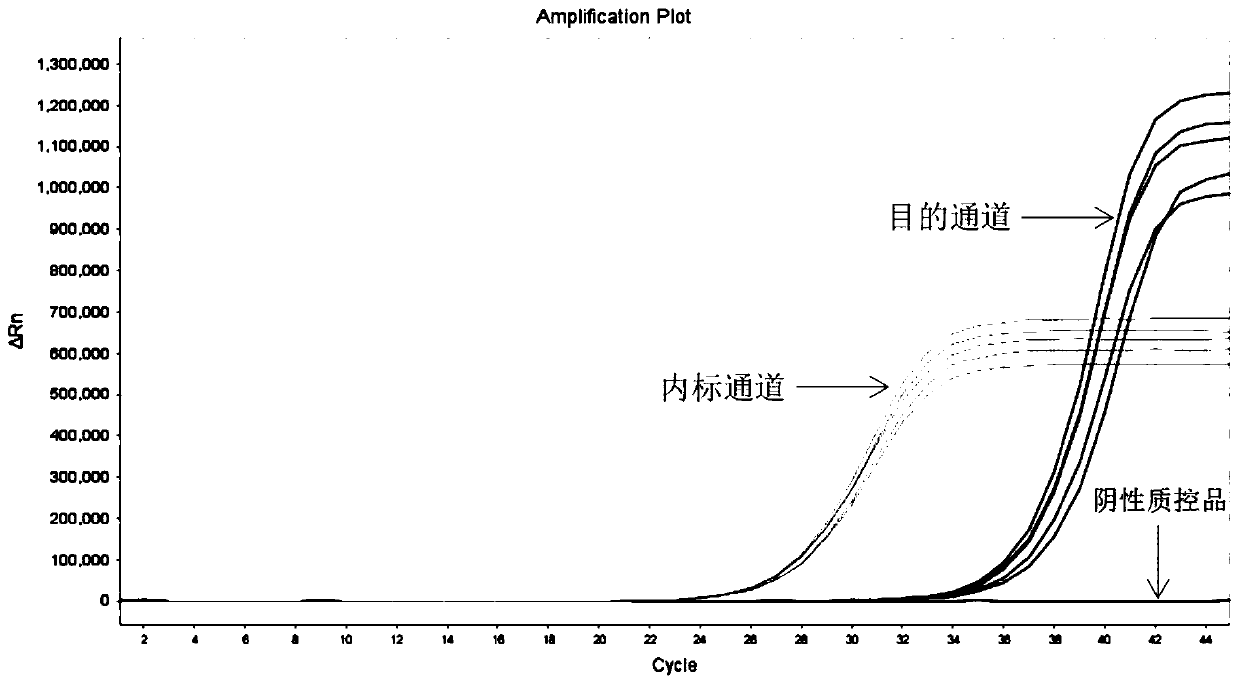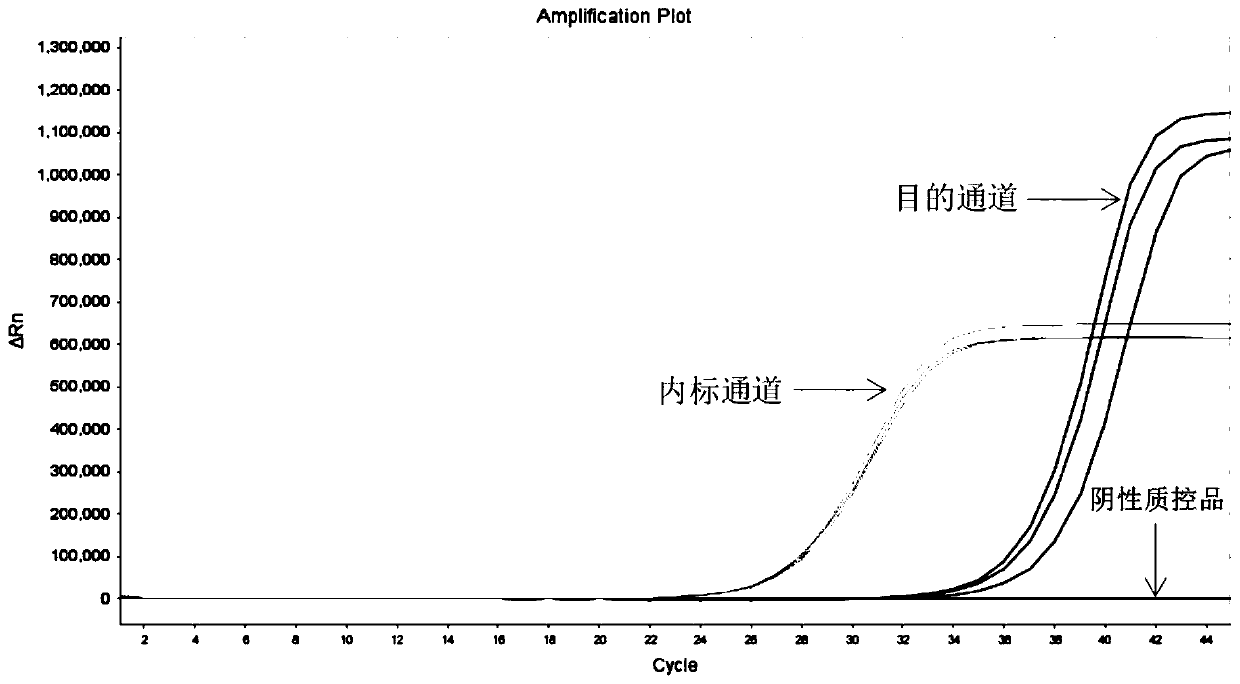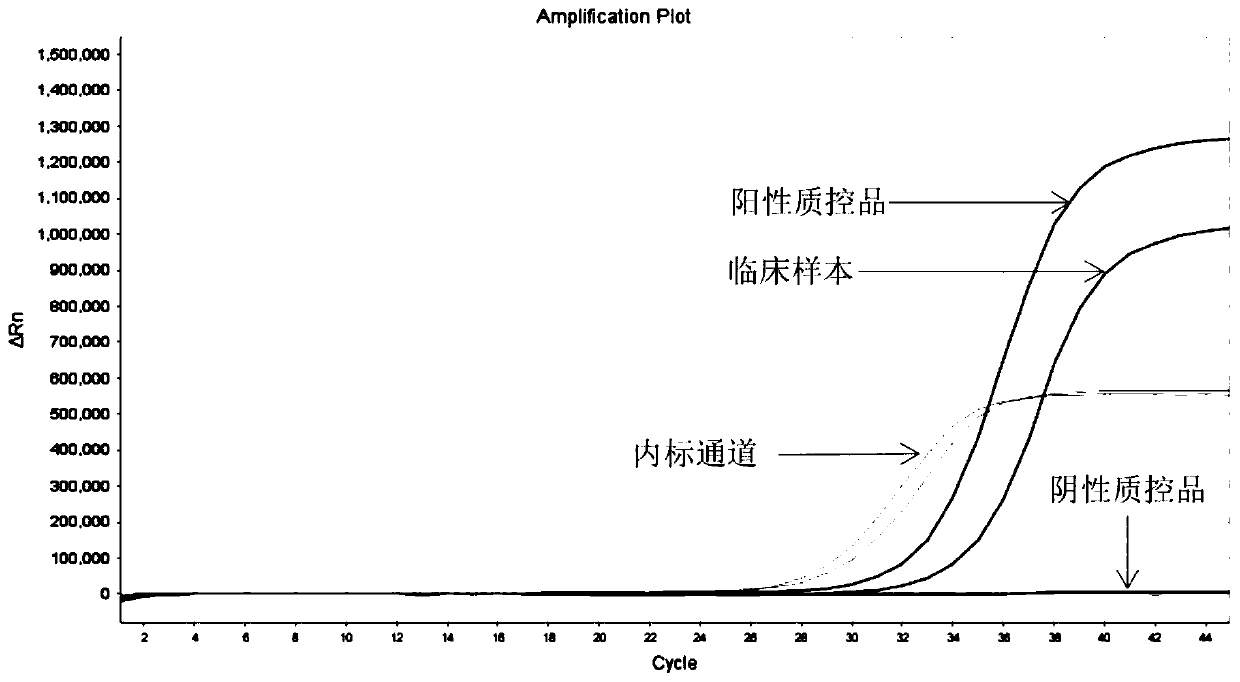Kit for detecting KRAS gene mutation
A kit and multiple detection technology, applied in the fields of biotechnology and tumor diagnosis, can solve the problems of high price, low sensitivity, sequence splicing burden, etc.
- Summary
- Abstract
- Description
- Claims
- Application Information
AI Technical Summary
Problems solved by technology
Method used
Image
Examples
Embodiment 1
[0111] The invention provides a method for detecting multiple gene mutations in lung cancer, primers, probes and a kit. The specific implementation steps are as follows:
[0112] (1) Extraction of nucleic acid templates from samples to be tested
[0113] Nucleic acid extraction or purification reagents from Sun Yat-Sen University Daan Gene Co., Ltd. (Tissue samples can use Yuesui Machinery Equipment No. 20170666; ascites and plasma samples can use Yuesui Machinery Equipment Number 20180628), and nucleic acid extraction is performed according to the kit instructions. The nucleic acid after tissue sample extraction is diluted to a concentration of 2-100ng / μL (the concentration of nucleic acid extracted from pleural fluid and plasma is not less than 2ng / μL), and the purity should meet A 260 / A 280 The ratio ranges between 1.7-2.3. The template can be used directly for subsequent experiments or stored at -80°C for future use, avoiding repeated freezing and thawing.
[0114] (2...
Embodiment 2
[0133] Embodiment 2 Sensitivity and accuracy detection
[0134] The sensitivity reference product with a nucleic acid concentration of 2ng / μL is composed of the detection gene locus plasmid DNA or cell line, and the wild-type cell line nucleic acid is mixed in a certain proportion, and the gene mutation rate of the mixture is 1%.
[0135] (1) Sample addition
[0136] Take 3 μL of DNase system and add it to each PCR reaction tube. Centrifuge briefly for 15s.
[0137] Take 5 μL negative quality control substance, sensitivity reference substance, and positive quality control substance respectively, and add them to the reaction tube in sequence according to the order in Table 5. Close the cap of the PCR reaction tube tightly, mix well, and centrifuge briefly for 10s.
[0138] For each sensitivity reference product, 5 repeated experiments.
[0139] (2) Real-time fluorescent PCR amplification:
[0140] Set the real-time fluorescent PCR amplification instrument to detect FAM sig...
Embodiment 3
[0148] Embodiment 3 clinical sample detection
[0149] Extraction of test sample nucleic acid:
[0150] (1) Extraction of nucleic acid templates from clinical samples to be tested
[0151] Collect 100 negative clinical samples, and randomly mix in one case each of G12S mutation, G12R mutation, G12C mutation, G12D mutation, G12V mutation, G12A mutation, G13C mutation, and G13D mutation confirmed by conventional methods. Nucleic acid extraction or purification reagents from Gene Co., Ltd. (Tissue samples can use Yuesui Machinery No. 20170666; ascites and plasma samples can use Yuesui Machinery No. 20180628). Nucleic acid extraction is carried out according to the kit instructions. The nucleic acid is diluted to a concentration of 2-100ng / μL (the concentration of nucleic acid extracted from pleural fluid and plasma is not less than 2ng / μL), and the purity should meet A 260 / A 280 The ratio ranges between 1.7-2.3. The template can be used directly for subsequent experiments or...
PUM
 Login to View More
Login to View More Abstract
Description
Claims
Application Information
 Login to View More
Login to View More - R&D
- Intellectual Property
- Life Sciences
- Materials
- Tech Scout
- Unparalleled Data Quality
- Higher Quality Content
- 60% Fewer Hallucinations
Browse by: Latest US Patents, China's latest patents, Technical Efficacy Thesaurus, Application Domain, Technology Topic, Popular Technical Reports.
© 2025 PatSnap. All rights reserved.Legal|Privacy policy|Modern Slavery Act Transparency Statement|Sitemap|About US| Contact US: help@patsnap.com



